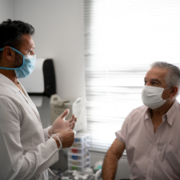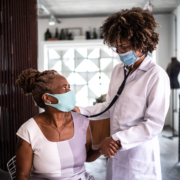Keeping Cancer Screening at the Forefront
To undergo cancer screening is a choice that we make- similar to diet, lifestyle, and other habits that can influence our overall health and well-being. However, the onset of the COVID-19 pandemic has resulted in disruptions to many aspects of our lives including a delay or cancellation of non-emergency medical appointments such as cancer screening.
Don’t put cancer screening on hold.
Regular screening can detect breast, colorectal, lung, prostate cancer, and skin cancer early – where various treatment options are available, likely effective, less expensive, and chances of survival are high. Unfortunately, not everyone will appreciate the value of screening until they experience severe symptoms, and worst, when diagnosed with an advanced staged disease.
Here are some screening tools used for some of the most common cancer types:
Breast cancer:
- Mammography is a commonly used screening tool to assess breast cancer. Your healthcare provider will look for breast changes such as white spots (calcifications), large abnormal areas (masses), and other suspicious areas that could be signs of cancer.
Colorectal cancer:
- Several tests are available to screen for colorectal cancer. Stool-based tests such as FOBT/FIT are available at BioReference. These tests are less invasive and can be done at home, so many people find them easier compared to a colonoscopy.
Lung cancer:
- Low-dose CT (LDCT) scans can help find abnormal areas in the lungs that may be cancer. Researchers have found that LDCT saves more high-risk lung cancer patients compared to chest x-rays.
Prostate cancer:
- Screening tests for prostate cancer include prostate-specific antigen (PSA) blood test and digital rectal examination (DRE). The PSA measures the level of PSA in the blood, which can be higher in patients who may have prostate cancer. During the DRE, your healthcare provider will look for any bumps or hard areas on the prostate that might be cancer.
Skin cancer:
- Skin cancer screening begins with a total examination of the skin. Your dermatologist (a doctor who specializes in skin problems) will examine you from head to toe- to look for irregular moles or concerning areas. If suspecting skin cancer, your dermatologist may use a technique called dermoscopy to look at spots more clearly. A skin self-exam is also recommended to look for any spots on the skin that are new or changing in size or color. If you noticed any abnormal changes, this should prompt you to schedule an appointment.
While COVID-19 has resulted in disruptions to many aspects of our lives including non-emergency medical appointments such as cancer screening, it is still important to make those appointments. Make the call and speak with your healthcare provider about cancer risks and screening options.
If you are a healthcare provider, click here to become a client so you can begin ordering diagnostic tests from BioReference and GenPath today.
Source:
American Cancer Society https://www.cancer.org/









